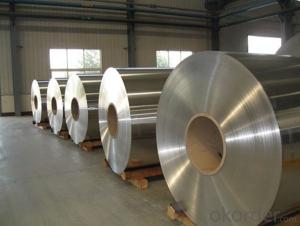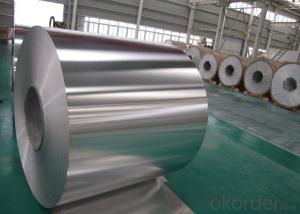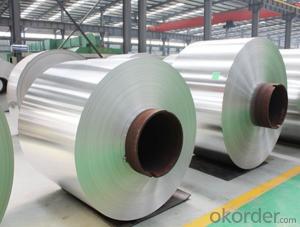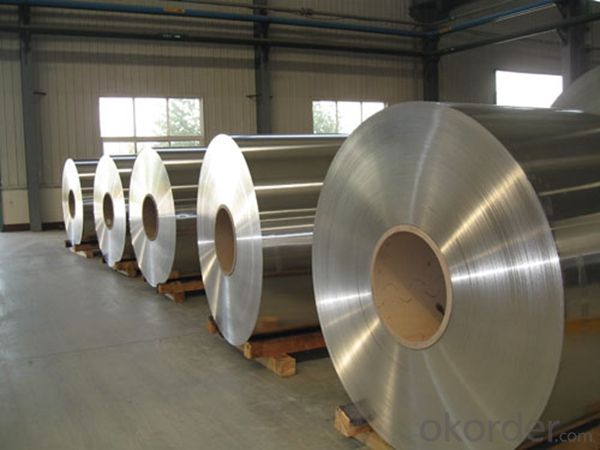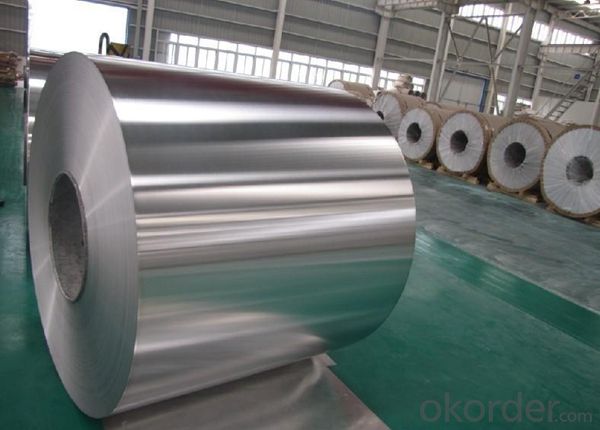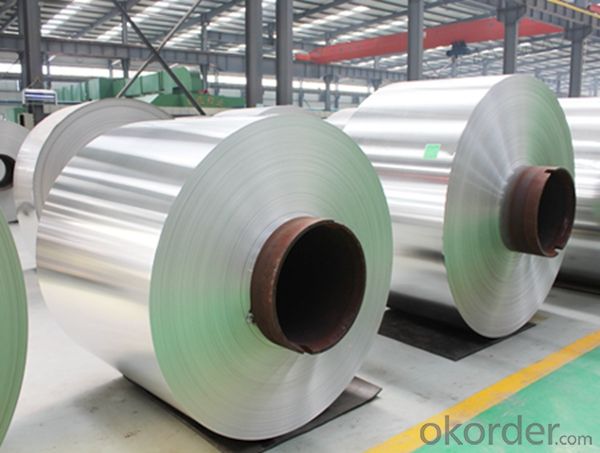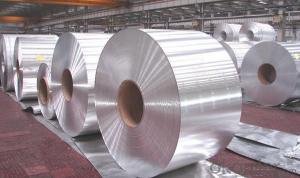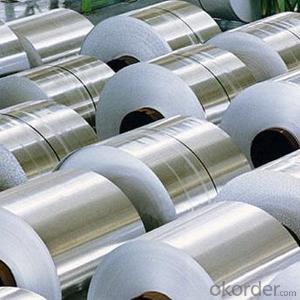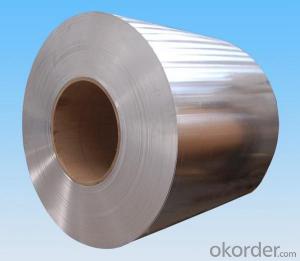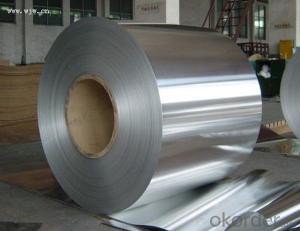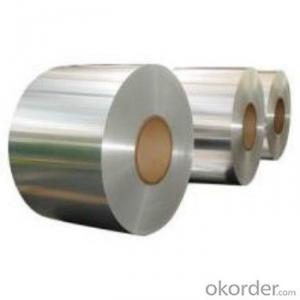Aluminum Coil Amerimax Upc 049821691820 Mill Finish Aluminium Coil AA1100 H14 for Building
- Loading Port:
- Shanghai
- Payment Terms:
- TT OR LC
- Min Order Qty:
- 5 m.t.
- Supply Capability:
- 10000 m.t./month
OKorder Service Pledge
OKorder Financial Service
You Might Also Like
Specification
1. Specification of Mill Finish Aluminium Coil AA1100 H14 for Building
Name | Aluminum Coil |
Brand | CNBM |
Alloy | 1100H-18, 3003-H24,3003-H26,3005-H26,8011,3004,3105,5005,etc. |
Thickness | 0.1~1.5mm |
Width | <2000mm< span=""> |
MOQ | 1 MT |
Coating finish | Brushed, drawing, embossed, printing |
Color | As to code RAL |
Surface | Embossed,Mill Finish,Coated,Brushed |
Gloss | 10-90%(EN ISO-2813:1994) |
Total coating thick | PVDF27 ~35micron |
Polyester18~27micron(EN ISO-2360:1995) | |
Coating hardness | 2H |
Adhesion | 5B (EN ISO-2409:1994) |
Impact resistance | No cracking and peeling (A.S.T.M D2794-1993) |
Flexibility (T-bend) | 0T- 2T |
MEK resistance | 100 |
Certification | ISO9001:2000, CE, SGS |
Coil's standard diameter | 1100mm |
Inner Diameter | 405mm/505mm |
Coil's standard weight | 1MT - 2MT |
2. Application of Mill Finish Aluminium Coil AA1100 H14 for Building
(1).Interior: wall cladding, ceilings, bathrooms, kitchens and balconies, shutters, doors...
(2).Exterior: wall cladding, facades, roofing, canopies, tunnels,column covers , renovations...
(3).Advertisement: display platforms, signboards, fascia, shop fronts...
3. Feature of Mill Finish Aluminium Coil AA1100 H14 for Building
*Such coil is specially designed to replace aluminum ingot, due to the high export tax of aluminum ingot, the coil has better price than ingot.
*This type of coil can fit customer's remelting furnace just like ingot, no need to make any change to the production line that was previously used for ingot. The standard coil size and weight is very suitable for the feed gate of furnace.
*This type of coil causes less material wastage than ingot when remelted.
*Our coil is made directly from ore, no need to go though the ingot making process, quality is much better than other suppliers who use ingot scrap to make coil.
Be free from Oil Stain, Dent, Inclusion, Scratches, Stain, Oxide Dicoloration, Breaks, Corrosion, Roll Marks, Dirt Streaks and other defect which will interfere with use
4. Certificate:
SGS and ROHS(if client request, paid by client), MTC(plant provided), Certificate of Origin(FORM A, FORM E, CO), Bureau Veritas and SGS (if client request, paid by client), CIQS certificate
5. Image of Mill Finish Aluminium Coil AA1100 H14 for Building
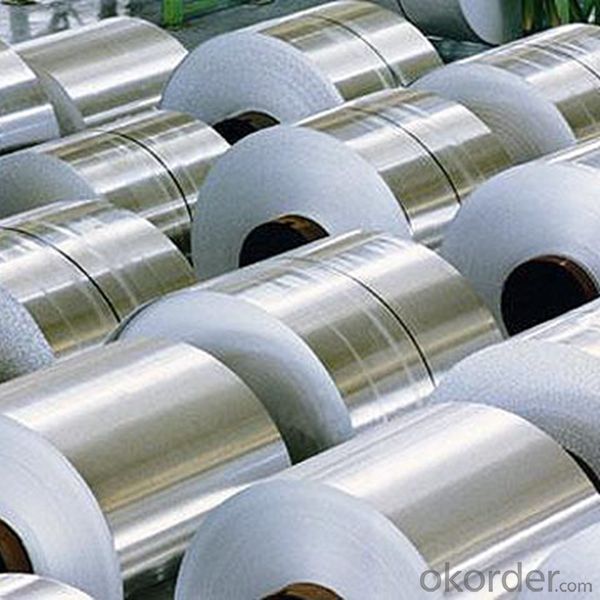
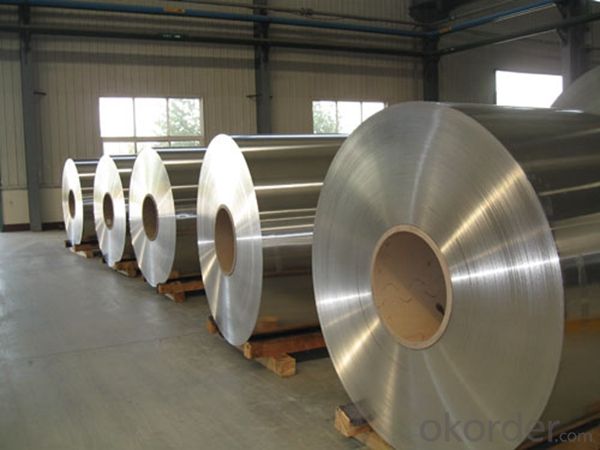
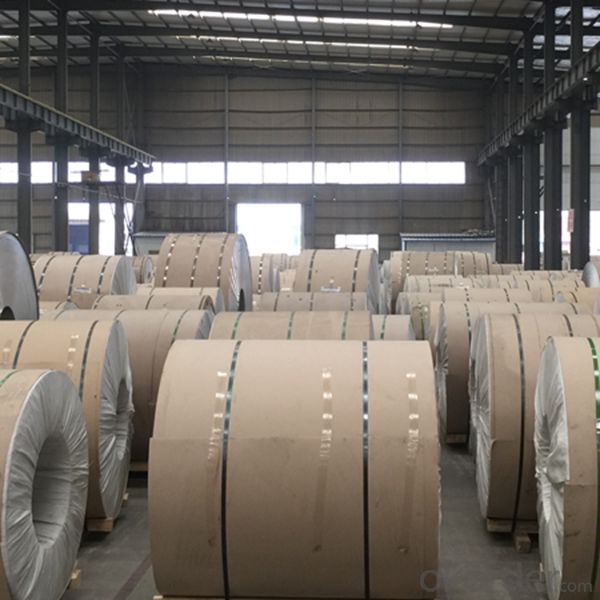
6. Package and shipping of Mill Finish Aluminium Coil AA1100 H14 for Building
eye to wall
eye to the wall
with wood pallet (wooded case also available)
7. FAQ
1) What is the delivery time?
Dpends on actual order, around 20 to 35 days
2)What is the QC system:
We have QC staff of 20 persons and advanced equipment, each production is with MTC traced from Aluminum ingot lot.
3) What market do you mainly sell to?
Australia, America, Asia, Middle East, Western Europe, Africa etc
- Q: What happens when you mix Aluminum (or magnesium) with calcium carbonate? Can you write a chemical equation please?
- Neither aluminium nor magnesium will react with calcium carbonate. The suggested displacement reaction would only occur if aluminium or magnesium were more electropositive than calcium. Electrode potential data shows that this is not the case. Calcium is more electropositive than both aluminium and magnesium.
- Q: Can aluminum coils be used for architectural applications?
- Yes, aluminum coils can be used for architectural applications. Aluminum is a versatile and lightweight material that offers excellent corrosion resistance, making it suitable for various architectural purposes. Aluminum coils can be used for exterior cladding, roofing, facades, and even interior applications like ceilings and wall panels. The coils can be easily formed, cut, and shaped, allowing for flexibility in design and creative architectural solutions. Additionally, aluminum coils can be coated with various finishes, such as paint or anodized coatings, to provide enhanced aesthetics and durability. Overall, aluminum coils are a popular choice in the architectural industry due to their versatility, durability, and aesthetic appeal.
- Q: What specific conditions or precautions need to be taken into account when storing and transporting steel wires intended for coiling purposes?
- <p>Yes, there are special requirements for storing and transporting steel wires for coiling. These wires must be kept dry to prevent rust and should be stored in a cool, dry place away from direct sunlight or extreme temperatures. They should be handled carefully to avoid kinks or deformations. When transporting, it's important to secure the coils to prevent shifting during transit, which could cause damage. Additionally, the packaging should be robust enough to protect the wires from moisture and physical damage.</p>
- Q: What are the different coil handling options available for aluminum coils?
- Aluminum coils have several options for handling, depending on the user's preferences and specific requirements. Some commonly used options include: 1. Coil Cradles: These are horizontal racks or frames that provide support and stability for aluminum coils during storage or transportation. They come in various sizes and designs to accommodate different coil dimensions. 2. Coil Cars: These mobile platforms have lifting mechanisms to easily move aluminum coils between different processing stations. They can be manually operated or automated, depending on the desired level of automation. 3. Coil Turnstiles: These rotating devices hold multiple coils vertically, allowing for easy access to individual coils without heavy lifting or rearranging. They are ideal for high-volume production environments that require quick coil changeovers. 4. Coil Upenders: Specialized equipment used to rotate or flip aluminum coils to change their orientation. They are useful for loading or unloading coils in a vertical position or for specific processes that require a particular coil orientation. 5. Coil Lifters: Specifically designed lifting devices for aluminum coils. They have adjustable arms or clamps to securely grip the coil for safe and efficient lifting. Available in manual, semi-automatic, and fully automated models. 6. Coil Tippers: Used to tilt or incline aluminum coils for various purposes such as coil feeding or inspection. They can be operated manually or powered by hydraulic or pneumatic systems. 7. Coil Stackers: Used to neatly stack and store aluminum coils vertically. They have adjustable arms or forks to accommodate different coil sizes, optimizing storage space and ensuring easy access when needed. These examples showcase the variety of coil handling options available for aluminum coils. Each option has its own advantages and suitability for different applications or industries. Careful consideration of specific requirements and constraints is essential when selecting the most appropriate coil handling solution.
- Q: What are the different types of aluminum alloy used in coil production?
- There are several different types of aluminum alloys used in coil production, including 1xxx, 3xxx, and 5xxx series alloys. These alloys offer varying levels of strength, corrosion resistance, formability, and other properties, making them suitable for different applications in the manufacturing industry.
- Q: This question asks for the uses or applications of aluminum coil in various industries or contexts.
- <p>Aluminum coil has a wide range of applications due to its lightweight, corrosion resistance, and high thermal conductivity. It is commonly used in construction for roofing and siding, in the automotive industry for parts and heat exchangers, and in the packaging industry for food and beverage cans. Additionally, aluminum coil is utilized in electrical applications such as transformers and electrical wiring due to its excellent conductivity. It is also employed in the manufacturing of household appliances, furniture, and various consumer goods. The coil's malleability makes it suitable for forming into various shapes and sizes, enhancing its versatility across different sectors.</p>
- Q: Can aluminum coils be used in the production of cans?
- Yes, aluminum coils can be used in the production of cans. Aluminum is widely used in the manufacturing of cans due to its excellent properties such as lightweight, durability, and corrosion resistance. In the production process, aluminum coils are typically formed into sheets and then cut into the desired size and shape of the can. These sheets are then coated, printed, and formed into cans using various techniques. The use of aluminum coils ensures the production of high-quality cans that are suitable for packaging various beverages and food products.
- Q: Are aluminum coils suitable for roofing?
- Absolutely, roofing can indeed make use of aluminum coils. Aluminum, a material highly durable and lightweight, has found extensive application in the construction sector for roofing. It presents numerous advantages, including resistance against rust, corrosion, and fire, rendering it an optimal choice for regions enduring severe weather or heightened humidity. Furthermore, aluminum coils boast exceptional thermal conductivity, facilitating the reflection of sunlight and consequent reduction in energy consumption, thereby resulting in decreased cooling expenses. Moreover, the installation and maintenance of aluminum roofing are easily accomplished, ensuring enduring safeguarding for residential, commercial, and industrial structures.
- Q: I want to know when it comes to racing which is better? I have a 24 inch aluminium bmx frame and want to know if chromoly frames are faster? Also before buying parts for my bike should I go all aluminum like the bars and forks? Also which is faster the aluminum or the chromoly frame?
- There are no 24 inch BMX frames.
- Q: What are the cost implications of using aluminum coils?
- The cost implications of utilizing aluminum coils can differ based on a variety of factors. To begin with, the expense of aluminum coils can be higher in comparison to other coil types, like copper coils. This is mainly because of the increased cost of raw materials and the energy-intensive manufacturing process involved in producing aluminum coils. Consequently, the initial purchase cost of aluminum coils may be higher when compared to other alternatives. Nevertheless, it is essential to consider the long-term cost implications. Aluminum coils are renowned for their durability and resistance to corrosion, which can result in an extended service life in contrast to other materials. This, in turn, can lead to reduced costs for maintenance and replacement over time. Additionally, aluminum is lightweight, making it easier to handle and transport, potentially resulting in reduced labor and transportation costs. Another aspect to consider is the energy efficiency of aluminum coils. Aluminum possesses excellent heat transfer properties, allowing for efficient heat exchange in various applications, such as HVAC systems or refrigeration units. This can translate to lower energy consumption and subsequently lower operating costs in the long run. Furthermore, aluminum is a highly recyclable material, which can contribute to cost savings and environmental benefits. Recycled aluminum can be utilized in the production of new coils, reducing the need for virgin materials and lowering overall costs. It is important to note that these cost implications may vary depending on the specific application and usage requirements. Factors such as the size of the system, installation complexity, and maintenance practices can also impact the overall cost-effectiveness of employing aluminum coils. In summary, while aluminum coils may have a higher initial purchase cost, their durability, resistance to corrosion, energy efficiency, and recyclability can result in long-term cost savings and environmental benefits.
Send your message to us
Aluminum Coil Amerimax Upc 049821691820 Mill Finish Aluminium Coil AA1100 H14 for Building
- Loading Port:
- Shanghai
- Payment Terms:
- TT OR LC
- Min Order Qty:
- 5 m.t.
- Supply Capability:
- 10000 m.t./month
OKorder Service Pledge
OKorder Financial Service
Similar products
Hot products
Hot Searches
Related keywords
